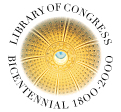


Public
Affairs Office
101 Independence Ave. SE
Washington DC 20540-1610
tel (202) 707-2905
fax (202) 707-9199
email pao@loc.gov
May 24, 2000
Press contact: Donna Urschel (202) 707-9191
Pinkerton contact: Mark Leaf (818) 706-5784
Library of Congress to Receive Pinkerton Archives
Pinkerton's Inc., the nation's oldest and largest security services company, has donated its archives to the Library of Congress. The archives document the history of the Pinkerton National Detective Agency, founded in 1850 by Scottish immigrant Allan Pinkerton, one of the most important figures in crime detection and law enforcement during the latter half of the 19th century.
Approximately 100 boxes of documents and photographs will be added to the Library's Manuscript Division, which holds nine volumes of Mr. Pinkerton's Civil War correspondence. The archives encompass the period from 1850 to 1938 and have never been accessible to the public. Selective access was given only to a limited number of authors and historians.
"We are honored that the Library of Congress considers our archives to be of historical significance and are proud to share the details of our organization's past with the nation," said Don W. Walker, Pinkerton's president. "It is particularly fitting that we make this gift in the year we also celebrate the 150th anniversary of the Pinkerton Agency."
The archives donation is part of the Gifts to the Nation Bicentennial Project to celebrate the 200th anniversary of the Library of Congress in 2000. The Gifts to the Nation Project encourages benefactors to donate rare and important materials to the national collection in the Library.
The archives include the following materials: 195 binders on criminal investigations; a large collection of photographs, including criminal "mug shots" of the day; biographical information on Mr. Pinkerton and his sons, William and Robert, who continued to run the agency after their father's death; correspondence; personnel files; promotional materials; canvassing papers; privately printed works of instruction for detectives; and privately published volumes on topics of interest of the agency.
Highlights of the archives include:
"The Tent Picture" of Mr. Pinkerton, outside his quarters, after the Battle of Antietam, in October 1862, with President Lincoln and General John McLernand, a former Chicago attorney. In letters from William Pinkerton, who accompanied his father during the Civil War as a 16-year-old cadet, he recalled that a portrait of the president alone had been planned, but Mr. Lincoln had ushered his two Chicago friends into the picture.
Two 1903 letters from William Rudolph, "The Missouri Kid," to William Pinkerton, in effect begging him to save his life. Mr. Rudolph, a young and extremely violent bank robber, had murdered in cold blood a novice detective who was the son of a Pinkerton superintendent. The letters were written from jail, following Mr. Rudolph's capture after an escape and long manhunt. Mr. Rudolph later was hanged.
An original 1901 photograph, by DeYoung Studio, in New York, of Harry Longbaugh, "The Sundance Kid," and his mistress, Etta Place, taken just before their departure for Argentina. Pinkerton detectives learned of the photograph when they were in Manhattan weeks later investigating the rumored embarkation of the "Wild Bunch" leaders. Mr. DeYoung, who knew nothing about the notoriety of his customers, reportedly was impressed with their elegance, and supposed that they were members of "Western Society." This is the only known photograph of Ms. Place. Pinkerton cropped separately the images of Ms. Place and Mr. Longbaugh, and reproduced both in WANTED posters.
Of the 195 criminal investigations binders, two-thirds cover the period of Pinkerton's greatest activity in criminal work, from 1880 to 1910. The binders contain photographs and sketches of criminals, suspects and gang members, as well as Pinkerton operatives; photographs and illustrations of burglar tools, safe-cracking equipment, and crimes in progress; REWARD and WANTED posters and handbills; many press clippings from 1870 to 1938; penciled daily draft reports from detectives; criminal histories (Pinkerton "rap sheets"), gang histories, and crime chronologies.
Also included are "office narratives," written by clerks, covering all or parts of an investigation; interoffice communications concerning investigations; correspondence with local law enforcement officials; correspondence with Pinkerton informants; letters to Pinkerton from criminals; and correspondence between criminals.
Ownership of the detective agency remained in the Pinkerton family for many years. In 1884, Mr. Pinkerton passed the agency to his sons, William and Robert. His grandson, Allan II, inherited the agency in 1907, and his great- grandson, Robert II, in 1930. When Robert Pinkerton II died in 1967, without a male heir, family direction of the corporation came to an end.
Pinkerton's Inc., has since grown to a $1.5 billion organization that provides a wide range of security services. The company has its U.S. headquarters in Westlake Village, Calif., and is a member of the Securitas Group of Stockholm, Sweden, a world leader in the security industry.
A selection of high-resolution digital photographs from the archives are available via email from pao@loc.gov.
# # #
PR 00-074
5/24/00
ISSN 0731-3527